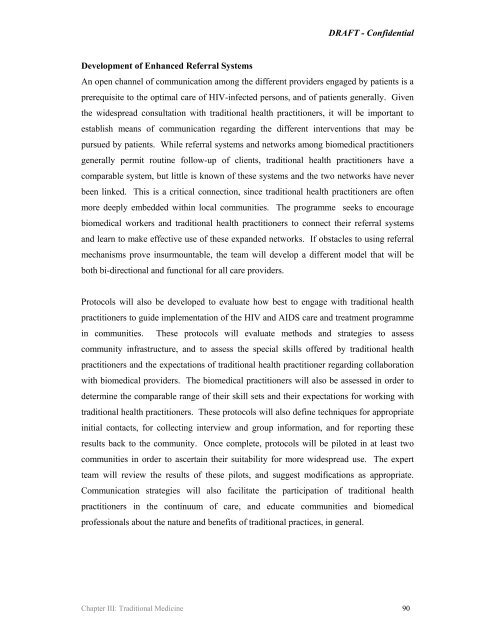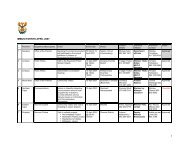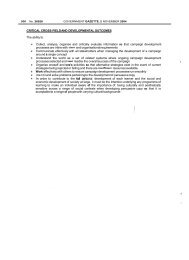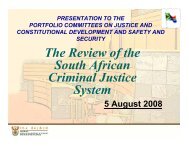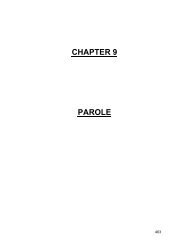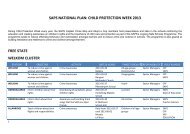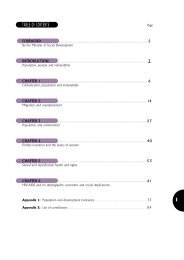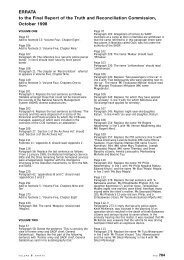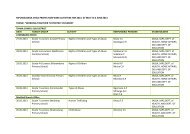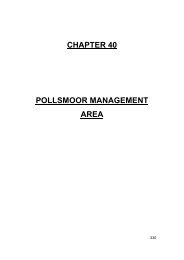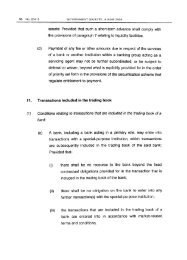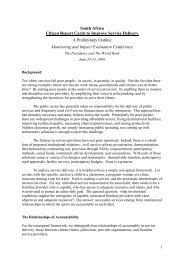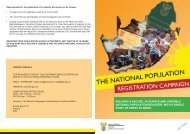Operational plan for comprehensive HIV and AIDS care and ...
Operational plan for comprehensive HIV and AIDS care and ...
Operational plan for comprehensive HIV and AIDS care and ...
You also want an ePaper? Increase the reach of your titles
YUMPU automatically turns print PDFs into web optimized ePapers that Google loves.
DRAFT - Confidential<br />
Development of Enhanced Referral Systems<br />
An open channel of communication among the different providers engaged by patients is a<br />
prerequisite to the optimal <strong>care</strong> of <strong>HIV</strong>-infected persons, <strong>and</strong> of patients generally. Given<br />
the widespread consultation with traditional health practitioners, it will be important to<br />
establish means of communication regarding the different interventions that may be<br />
pursued by patients. While referral systems <strong>and</strong> networks among biomedical practitioners<br />
generally permit routine follow-up of clients, traditional health practitioners have a<br />
comparable system, but little is known of these systems <strong>and</strong> the two networks have never<br />
been linked. This is a critical connection, since traditional health practitioners are often<br />
more deeply embedded within local communities. The programme seeks to encourage<br />
biomedical workers <strong>and</strong> traditional health practitioners to connect their referral systems<br />
<strong>and</strong> learn to make effective use of these exp<strong>and</strong>ed networks. If obstacles to using referral<br />
mechanisms prove insurmountable, the team will develop a different model that will be<br />
both bi-directional <strong>and</strong> functional <strong>for</strong> all <strong>care</strong> providers.<br />
Protocols will also be developed to evaluate how best to engage with traditional health<br />
practitioners to guide implementation of the <strong>HIV</strong> <strong>and</strong> <strong>AIDS</strong> <strong>care</strong> <strong>and</strong> treatment programme<br />
in communities. These protocols will evaluate methods <strong>and</strong> strategies to assess<br />
community infrastructure, <strong>and</strong> to assess the special skills offered by traditional health<br />
practitioners <strong>and</strong> the expectations of traditional health practitioner regarding collaboration<br />
with biomedical providers. The biomedical practitioners will also be assessed in order to<br />
determine the comparable range of their skill sets <strong>and</strong> their expectations <strong>for</strong> working with<br />
traditional health practitioners. These protocols will also define techniques <strong>for</strong> appropriate<br />
initial contacts, <strong>for</strong> collecting interview <strong>and</strong> group in<strong>for</strong>mation, <strong>and</strong> <strong>for</strong> reporting these<br />
results back to the community. Once complete, protocols will be piloted in at least two<br />
communities in order to ascertain their suitability <strong>for</strong> more widespread use. The expert<br />
team will review the results of these pilots, <strong>and</strong> suggest modifications as appropriate.<br />
Communication strategies will also facilitate the participation of traditional health<br />
practitioners in the continuum of <strong>care</strong>, <strong>and</strong> educate communities <strong>and</strong> biomedical<br />
professionals about the nature <strong>and</strong> benefits of traditional practices, in general.<br />
Chapter III: Traditional Medicine 90


